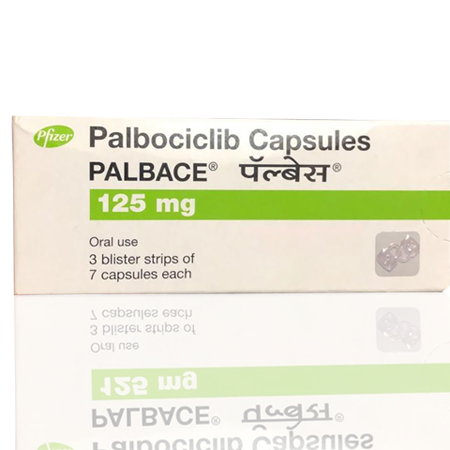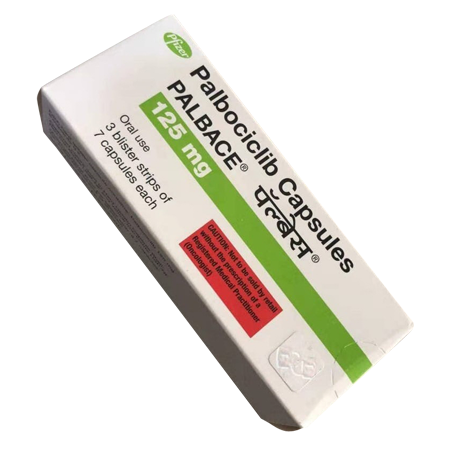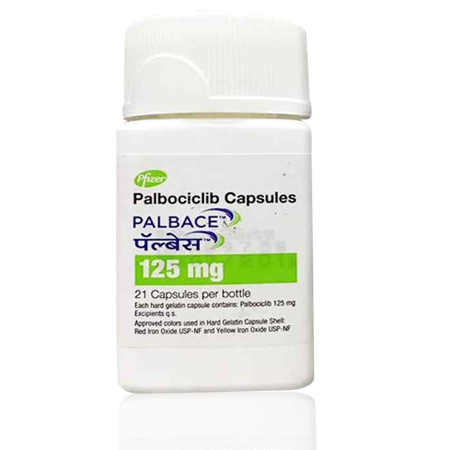 Introduction
IntroductionUSES OF PALBACE CAPSULE
- Breast cancer
Palbace Capsule is used to treat patients with certain types of breast cancer (estrogen receptor-positive, human epidermal growth factor receptor 2-negative) which have spread to other organs. It is given together with hormonal anticancer therapies.
Palbace Capsule should be taken with food, but try to have it at the same time every day to get the most benefits.? Your doctor will decide what dose is necessary and how often you need to take it. This will depend on what you are being treated for and may change from time to time. You should take it exactly as your doctor has advised. Taking it in the wrong way or taking too much can cause very serious side effects. It may take several weeks or months for you to see or feel the benefits but do not stop taking it unless your doctor tells you to.
Some common side effects of this medicine include fatigue, hair loss, rash, vomiting, and diarrhea. This medicine may reduce the number of blood cells (decrease red blood and white blood cells) in your blood, thereby, increasing the susceptibility to infections. It is better to inform your doctor if you notice symptoms of infection like fever, chills, and weakness, bleeding or bruising and nose bleed. It might also cause dizziness if it happens avoid driving or attention-seeking activities.
Before taking it, tell your doctor if you have heart disease, liver, or kidney problems or are taking any medicines to treat infections. Many other medicines can affect, or be affected by, this medicine so let your healthcare team know all medications you are using. This medicine is not recommended during pregnancy or while breastfeeding. The use of effective contraception by both males and females during treatment is important to avoid pregnancy.
 Warning & Precautions
Warning & PrecautionsPregnancy & Breast Feeding
- Palbace Capsule is unsafe to use during pregnancy as there is definite evidence of risk to the developing baby. However, the doctor may rarely prescribe it in some life-threatening situations if the benefits are more than the potential risks. Please consult your doctor.
- Palbace Capsule is unsafe to use during breastfeeding. Data suggests that the drug may cause toxicity to the baby.
Driving & Using Machines
- Palbace Capsule may cause side effects which could affect your ability to drive.
It may cause fatigue in some people. If this happens, you should exercise caution when driving or using machines.
![]() How to Use
How to Use
- Take this medicine in the dose and duration as advised by your doctor.
- Do not chew, crush or break it.
- Take it with food, preferably at the same time every day.
- If you forget to take the medicine or vomit, skip the missed dose and follow a regular schedule. Do not take a double dose to make up missed dose
- Use effective contraception method to prevent pregnancy while taking this medicine.
- It may cause dizziness. Avoid driving or any activity requiring mental focus until you know how it affects you.
- You may be asked for regular blood tests while taking this medication. Inform your doctor if you notice symptoms of infection like fever, chills, and weakness.
 Side Effects
Side EffectsLike all medicines, this medicine can cause side effects, although not everybody gets them
Common
- Fatigue
- Hair loss
- Rash
- Vomiting
- Diarrhea
- Nausea
- Decreased blood cells (red cells, white cells, and platelets)
- Infection
- Decreased appetite
- Fever
 FAQs
FAQsQ. What kind of medicine is Palbace?
Palbace is an anti-cancer medicine. Palbace blocks proteins known as cyclin-dependent kinase inhibitors. Blocking these proteins can slow down the growth of cancer cells and delay the progression of the cancer.
Q. How long do I have to take Palbace?
The duration of treatment varies from person to person. Your doctor will decide the number of cycles you need to receive based on your condition, response to treatment and your tolerance to side effects. Your doctor may decrease your dose or stop your treatment temporarily or permanently if you experience certain side effects.
Q. Are the side effects of Palbace irreversible?
No, most of the side effects are reversible and disappear when the medicine is stopped. Neutropenia is a well-recognized adverse effect of Palbace in which the number of your white blood cells get reduced and your immune system gets weakened. As a result, you may be at greater risk of getting an infection while you are taking Palbace. However, this side effect disappears rapidly once you stop taking the medicine.
Q. Does treatment with Palbace require monitoring of blood counts?
Yes, blood tests are important since this medicine can lower your blood counts. The regular blood tests check the effect of Palbace on your blood cells (white blood cells, red blood cells, and platelets). These tests should be done at the beginning of each chemotherapy cycle, on the 15th day of the first 2 cycles, and as clinically indicated.
Q. How should I take Palbace?
Generally, Palbace is taken once daily for 21 consecutive days followed by 7 days off treatment to add up a complete cycle of 28 days. Take this medicine with food and at the same time each day. Swallow the whole capsules. Do not open, chew, or crush them. Do not take the capsules that are broken or cracked. If you vomit after taking Palbace, do not take another dose and continue your regular dosing schedule.
Q. Do I need to use birth control method while using Palbace?
Women of childbearing potential who are receiving Palbace and their partners should use adequate contraceptive methods (e.g. double-barrier contraception such as condom and diaphragm). These methods should be used during therapy and for at least 3 weeks after completing therapy for females. Men who are on Palbace therapy should use birth control methods for at least 14 weeks after completing the therapy.
Q. Does Palbace affect fertility?
Male fertility may be affected during treatment with Palbace. Thus, men may consider sperm preservation prior to beginning therapy with Palbace.
Q. What are the serious side effects of Palbace?
The serious side effects of Palbace include shortness of breath, dizziness, weakness, unusual bleeding or bruising or nosebleeds. It may also cause fever, chills or signs of infection and fast, irregular or pounding heartbeat. If you experience any of these symptoms, call your doctor immediately or get emergency medical treatment.
 Disclaimer:
Disclaimer:The contents of this website are for informational purposes only and not intended to be a substitute for professional medical advice, diagnosis, or treatment. Please seek the advice of a physician or other qualified health provider with any questions you may have regarding a medical condition. Do not disregard professional medical advice or delay in seeking it because of something you have read on this website.
PRODUCT DETAILS
ALTERNATE BRANDS View All
The contents of this website are for informational purposes only and not intended to be a substitute for professional medical advice, diagnosis, or treatment. Please seek the advice of a physician or other qualified health provider with any questions you may have regarding a medical condition. Do not disregard professional medical advice or delay in seeking it because of something you have read on this website.










